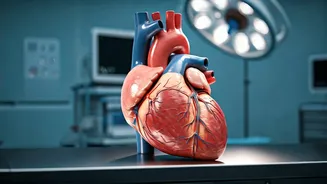Defining Heart Failure
Heart failure represents a complex condition wherein the heart's ability to effectively pump blood is compromised, leading to insufficient blood flow and
oxygen supply throughout the body. Contrary to its name, heart failure doesn't imply the heart has stopped working entirely; rather, it indicates a weakening of the heart muscle or impaired function. Several factors can contribute to heart failure, including high blood pressure, coronary artery disease, and other underlying health issues. Depending on the specifics, the heart may struggle to pump blood efficiently, or it may not adequately fill with blood between beats. These issues can result in a range of symptoms, impacting daily life and potentially leading to serious health complications if left unaddressed. Understanding the nuances of heart failure is the first crucial step toward recognizing the signs and seeking prompt medical attention.
Common Symptoms Uncovered
Several signs and symptoms can indicate the presence of heart failure. Fatigue and weakness are frequently experienced, as the body struggles to receive adequate oxygen. Shortness of breath, particularly during exertion or when lying down, is another common symptom. This can occur because the lungs become congested with fluid. Swelling, known as edema, often appears in the ankles, feet, and legs due to fluid buildup. Other symptoms to watch for include rapid or irregular heartbeats, a persistent cough, and decreased appetite or nausea. These symptoms can worsen over time. Awareness of these symptoms is critical for early detection, enabling timely intervention and management. It's essential to consult a healthcare professional if any of these symptoms are experienced, especially if they worsen or persist.
Early Detection Matters
Early detection of heart failure is crucial for effective management and improving outcomes. Early diagnosis enables doctors to implement interventions that can slow the progression of the disease and alleviate symptoms. Diagnostic methods include physical examinations, medical history review, and various tests such as blood tests, electrocardiograms (ECGs), echocardiograms, and potentially cardiac catheterization. Through ECGs, doctors can evaluate the heart's electrical activity, providing insights into any irregularities. Echocardiograms utilize sound waves to visualize the heart's structure and function, which helps to evaluate heart muscle strength. Early detection is not merely about identifying the condition but also about implementing strategies to protect heart health and enhance the overall quality of life.
Prevention is Key
Preventing heart failure involves adopting a heart-healthy lifestyle that minimizes risk factors. This approach centers on a balanced diet rich in fruits, vegetables, and lean proteins, while limiting saturated and trans fats, sodium, and processed foods. Regular physical activity, such as brisk walking or swimming, can significantly improve cardiovascular health. It's also essential to manage conditions like high blood pressure, high cholesterol, and diabetes through medication and lifestyle modifications as prescribed by a doctor. Avoiding smoking and limiting alcohol intake are also vital. Regular check-ups with a healthcare provider can help monitor and manage existing conditions while identifying potential issues early on. Lifestyle modifications, when combined with regular medical check-ups and screenings, form a proactive approach to prevent or manage heart failure and improve overall cardiovascular health.
Seek Medical Advice
If you experience any symptoms of heart failure, seeking prompt medical advice is essential. Early intervention can make a significant difference in managing the condition and preventing complications. A healthcare professional can perform a comprehensive evaluation, including a physical examination and diagnostic tests, to determine the underlying cause and severity of the condition. They can then recommend an individualized treatment plan tailored to your specific needs. Treatment options may include medications to control blood pressure, reduce fluid retention, and improve heart function. In some cases, more invasive treatments like surgery or the implantation of medical devices may be necessary. By seeking timely medical attention, you're taking a proactive step toward protecting your heart health and improving your overall well-being. Don’t hesitate to discuss any health concerns with your healthcare provider; early action is often the best defense.













